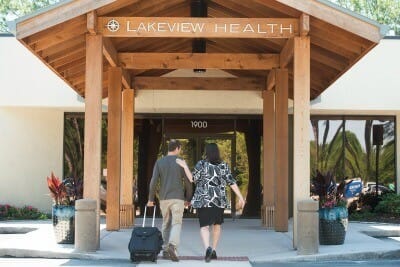

By: Lakeview Health
Addiction is often described as a family disease that goes well beyond being a medical problem for an individual. “Addiction is a family disease that stresses the family to the breaking point, impacts the stability of the home, the family’s unity, mental health, physical health, finances, and overall family dynamics,” according to the National Council on Alcoholism and Drug Dependence. It is also common for family members to ignore the substance use disorder of a loved one for too long in the hope that it will somehow disappear without intervention. Or they simply feel powerless to change the situation. Examples are parents ignoring or trying to manage unhealthy behaviors of their children, such as lying about using drugs or alcohol, stealing to finance drug use, or hiding academic failure caused by their addiction. Or an alcoholic parent could be engaging in risky behavior such as drunk driving, jeopardizing their professional career or being unable to provide parental guidance due to frequent intoxication. Issues like these need to be addressed in treatment. It is a two-way street: the substance use disorder of an individual does not only put a lot of stress on the family unit, addiction treatment also has a much better chance of leading to stable recovery if patients enjoy strong family support. “Family and friends can play critical roles in motivating individuals with drug problems to enter and stay in treatment,” according to the National Institute on Drug Abuse. “Family therapy can also be important, especially for adolescents. Involvement of a family member or significant other in an individual’s treatment program can strengthen and extend treatment benefits.” (Principles of Drug Addiction Treatment) The family should be involved in the treatment process as soon as possible and as much as necessary. Relationships are often frayed to the point of entirely cutting off the person in active addiction. This rejection can easily cause additional stress and trauma for the addicted person. Or family members try to manage the substance use of a loved one, keeping it secret because of the perceived shame and stigma. These behaviors are known as co-dependency. At Lakeview Health, a three-day family program is part of the gender-responsive treatment program. Like all of our treatments, it is based entirely on the most current, evidence-based practices. Lakeview is committed to helping the families of our patients repair their relationships and staff is selected to ensure the best quality of care. The family program Lakeview Health offers:
- Information for the family about the disease of addiction
- Weekly family contact with the patient’s therapist
- Family relapse prevention plan to end enabling behaviors
- Support for family members who have been affected by their loved one’s addiction
- A signed contract between patient and family, reinforcing commitment to recovery
- Development of an aftercare plan for the patient and family
- Approved therapeutic visitations in a safe and supportive environment
- Aftercare support for families after treatment
Residential treatment is only the beginning of the long recovery journey. Families need to heal and support their loved one, especially in early recovery. Often, families also need to learn how to manage their own recovery while their loved one is in treatment, including possible co-dependency and communication issues. Participants of the Lakeview Health family program receive great recovery resources, information, and knowledge that will support the continued recovery of the entire family.





